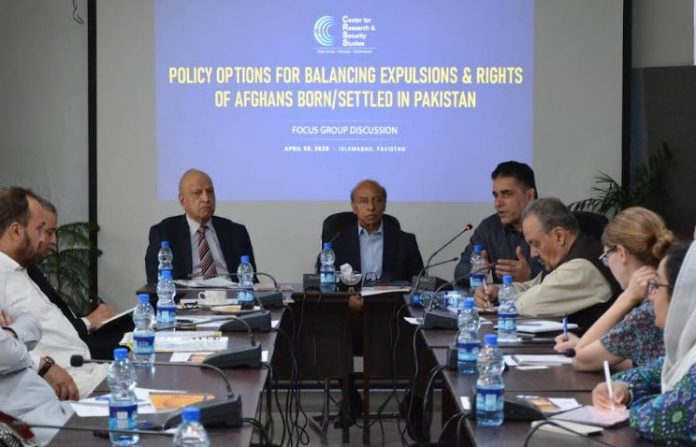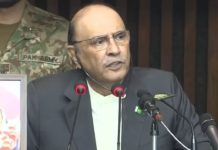ISLAMABAD, APR 30 /DNA/ – Ambassador (retd) Asif Durrani underscored the complexity of the Afghan refugee situation in Pakistan, reminding all stakeholders that “this is not just Pakistan’s responsibility – the international community must share the burden”. He emphasized the need for a balanced approach, recognizing the distinction between security concerns and the legitimate presence of peaceful, long-settled Afghan businesspeople.
Speaking at the Focus Group Discussion titled Policy Options for Balancing Expulsions & Rights of Afghans Born/Settled in Pakistan, Pakistan’s former envoy for Afghanistan called for international cooperation, pointing out that the issue transcends national borders and reflects a broader humanitarian and political challenge that demands urgent multilateral attention.
The discussion was organized by the Center for Research and Security Studies (CRSS) with participation from the Afghan business community based in Pakistan, representatives from the diplomatic community, and former envoys and regional experts.
Ambassador Durrani said that the international acknowledgement that there is now peace in Afghanistan serves as a pull factor for the repatriation of Afghans living in Pakistan. It is widely known that most Afghans here don’t want to stay in Pakistan – they want to move to the US or Europe. However, after President Trump’s policy changes, that pathway is now blocked, and they are stuck in limbo.
While I sympathize deeply with the Afghan people, this is not just Pakistan’s responsibility as a matter of fact – the international community must share the onus. Therefore, the Afghans must raise their case at the international level, appealing to the broader international community to accommodate and help them, recognizing them as political refugees. Pakistan must do its part, but so should others.
“Yes, this is a humanitarian crisis. Children born here should have the right to citizenship. But more than that, it is also the responsibility of the current Afghan government to act responsibly, understand the gravity of the situation, and make efforts that help Afghans continue to live in Pakistan. If they continue supporting TTP, BLA, etc., how can Pakistan accommodate Afghans here?This has to be quid pro quo- mutual cooperation. If we join hands, we can find a solution”, he concluded.
Dr. Shoaib Suddle, Former Federal Tax Ombudsman and Former IG Police, noted that under international law, deportation is justified only on specific grounds: threat to public order, national security, espionage, terrorism, organized crime, overstaying a visa, or fraudulent asylum claims. Otherwise, it becomes a human rights issue.
He added that Afghan businessmen contributing positively to the Pakistani economy and billions in taxes to the national exchequer should itself be a justification for allowing them to stay – that can evenbe a pathway to citizenship.
While we cannot ignore the threat TTP poses, we must welcome businessmen and investors. We should make it easier for them to engage in business activities in Pakistan, as it is a high risk for them to conduct transactions through friends.
Not everyone qualifies for citizenship, and even in the US, birthright citizenship is being reconsidered. But where people are bringing money and investment, they should be treated as special cases.
“There is a need to be more humane”, he concluded.
“Pakistan and Afghanistan, as President Karzai used to call it, are like Siamese twins and cannot be separated. Pakistan’s 1951 Citizenship Act isn’t overly complicated – if applications had been submitted in time, many of these issues could have been resolved”, said the Former Ambassador, Dr. Major General (retd) Raza Muhammad.
He added that after the Taliban takeover, there was hope for peace – but now that hope has faded due to TTP, BLA, ISKP, and other threats. We face enormous security challenges, with terrorism hurting Pakistan’s economy, civilians and security forces, CPEC and Chinese interests, etc.
“To the Afghan business community – I urge you to use your influence and pressurize your government to act for peace. Otherwise, regional economic stability is impossible.”
The way forward from the current state of affairs between Pakistan and Afghanistan lies in the involvement of the international community, B2B diplomacy, and G2G dialogue.
In the long run, Pakistan will have to legislate to deal with Afghans who never registered but have been living here for decades, have families, and are contributing to our economy – they should be absorbedinto the Pakistani society with open arms, he concluded.
The participating Afghan businessmen noted they have lived in Pakistan for decades, with families established there. Their children were born and educated in Pakistan, speak only local languages, and see the country as their home. They have built extensive businesses across Pakistan and beyond, pay taxes (some reportedly in the billions), employ Pakistani workers, and contribute significantly to the national economy.
Despite their contributions, they face major hurdles: i) cannot own property or register businesses in their own names, ii) must rely on Pakistani friends for legal transactions, which is risky, iii) long delays and stagnation in citizenship and visa applications despite meeting all requirements.
They said that a looming June 30 deadline to expel Afghans has caused alarm as they fear losing everything – homes, businesses, loans, and community ties. They argued that children born in Pakistan should be granted citizenship, in line with international norms. Deporting long-settled, peaceful, and economically contributing individuals should be seen as a human rights issue.
They requested compassion, regularization of status, and a path to citizenship, stressing they are peaceful and apolitical. Some expressed helplessness regarding pressuring the Afghan government or addressing terrorism concerns.They felt abandoned by the international community and viewed themselves as victims of geopolitics – discarded by powers who once relied on them.
“Is it not unfair to conflate Afghan businesspeople with the issue of TTP? Why not just allow them to go through the naturalization process?”,the executive director of CRSS, Imtiaz Gul,asked the participants.
“We must prioritize who should stay and who should go. As part of Beyond Boundaries, we have advocated for streamlining these issues, enabling Afghan businesspeople to open bank accounts and access basic services”, he concluded.

















